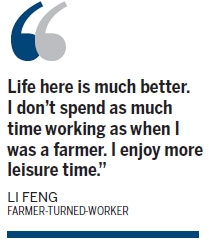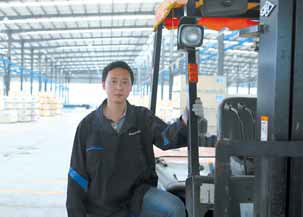..
Farmers enjoy urban life after relocation
Updated: 2014-06-24
By James Healy and Ji Jin, China Daily
Each workday, Li Yingmu rides his motorcycle on the 10-minute commute to his job at a factory in Chongqing's Liangjiang New Area. It's a short trip for Li, but a far cry from the challenging life he led not so long ago as a corn and wheat farmer in the nearby fields.
Those fields are gone now - absorbed by one of Liangjiang New Area's many new development projects - and Li is one of thousands of rural residents who have relocated as Chongqing expands to become a major trade crossroads of inner China.
"It's a big task" to balance urban and rural development on such a large scale, acknowledged Ling Yueming, director general of the Administrative Committee of Liangjiang New Area.
How to best do so is "a very complex question", considering that 20 million of Chongqing's 30 million people live in rural areas, he said.
"We must help farmers who move to the city adapt to urban life. And we must make sure that those who move from rural areas have jobs and a place to live," Ling said.
In addition to those who relocate, Chongqing must also accommodate the natural flow of the rural population into the city, as well as the many migrants who earlier left Chongqing and are returning now that the area is thriving, Ling said.
By the year 2020, Ling's office said, the total population of Liangjiang New Area is expected to reach 5 million, of which more than 1 million will be rural migrants from other cities and provinces. The number of people expected to relocate from rural areas of Chongqing is expected to reach 380,000.
Before relocating to the Hehe Community in the New Area, Li, the factory employee, worked long hours as a farmer. He is now a truck driver for the Chongqing Brilliant Elevator Co, a private enterprise that manufactures elevators for sale inside and outside of China.
Li Feng also works at the elevator factory. When he relocated, the government provided a month of training and helped him obtain his present position as a forklift operator, a job that pays 3,000 yuan ($480) per month.
Adapting to city life "was not that difficult", he said, because the government solved two important problems for him - he now has good housing and stable employment.
"Life here is much better. I don't spend as much time working as when I was a farmer. I enjoy more leisure time," he said.
His standard of living is also much higher, said Li Feng, a 28-year-old who is also a former corn and wheat farmer.
"Our income as farmers for the whole family was not so high - 10,000 yuan a year," Li Feng said. The combined income of Li, his wife and his parents, who live with him in the nearby Hehe Community, is now 7,000 yuan per month.
New Area director Ling, in an exclusive interview with China Daily, said that of the 137,000 rural people who have been relocated so far during the development of the Liangjiang New Area (the figure includes children and the elderly), 73,000 are former farmers who have found new employment. Only 7,300 have not found jobs, mostly because their age makes it difficult for them to find work, he said.
"But we have not given up on those not able to find work," Ling said. "We help them find government positions such as management of green belts, traffic coordination and street cleaning."
"As long as we have jobs, we'll fill them with people from the area who have been relocated," he said. "But we should let the market guide people to jobs. We need to develop local economies, create more tax sources and more jobs."
He said the government "is holding match-up meetings between enterprises and farmers who have been relocated and are looking for work". Additionally, the government is paying intermediary organizations "to help provide a bridge between farmers and new enterprises".

Last year, Chongqing registered 735 new enterprises, he said. "These create new job opportunities."
The government also provides job training for the former farmers and public housing for as little as 300 yuan to 400 yuan per month, Ling added.
After corn and wheat farmer Peng Jize, 36, was relocated, he was trained for about a month for his job as a truck driver at the 120,000-square-meter elevator factory. When asked what he misses about farm life, Peng laughed and said, "Nothing."
Li Yingmu, who is 48 years old, likewise prefers his new urban life. What he enjoys most is the stable income. He said he's paid more than 3,000 yuan per month as a truck driver.
But there's so much more to like, he said. "The environment is good and clean. We have a clean and clear atmosphere and good air. And the standard of living is better. We can use gas for cooking, which we did not have as farmers."
Li Yingmu acknowledged that not everyone prefers the lifestyle after relocation. "Some of the senior citizens who were farmers are now too old to work," he said. "They miss the land. They miss the old life. They want to grow food. The younger farmers want to make more money."
Li Feng, the forklift operator, said there was another reason he was glad to leave the rural life behind. "Now we don't have to worry about the harvest."
Contact the writers at jameshealy@chinadaily.com.cn and jijin@chinadaily.com.cn
|
Li Feng, a forklift operator at an elevator factory in Liangjiang New Area, is a former farmer who said he is adapting well to life in the city because of his stable income. Wang Jing / China Daily |
(China Daily 06/24/2014 page6)
Video

UK trade commissioner for China praised Chongqing as a burgeoning center in intelligent manufacturing.






